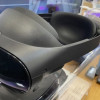Science Says Fitness Trackers Don't Work. Wear One Anyway

Personal technology is getting a bad rap these days. It keeps getting more addictive: Notifications keep us glued to our phones. Autoplaying episodes lure us into Netflix binges. Social awareness cues—like the "seen-by" list on Instagram Stories—enslave us to obsessive, ouroboric usage patterns. (Blink twice if you've ever closed Instagram, only to re-open it reflexively.) Our devices, apps, and platforms, experts increasingly warn, have been engineered to capture our attention and ingrain habits that are (it seems self evident) less than healthy.
Unless, that is, you're talking about fitness trackers. For years, the problem with Fitbits, Garmins, Apple Watches, and their ilk has been that they aren't addictive enough. About one third of people who buy fitness trackers stop using them within six months, and more than half eventually abandon them altogether.
As for that guy at work whose Fitbit appears to be bionically integrated with his wrist, it's unclear whether wearing the thing actually makes him more fit. Most studies on the effectiveness of fitness trackers have produced weak or inconclusive findings (blame short investigation windows and small, homogenous sample sizes). In fact, two of the most well-designed studies to date have turned up less than stellar results.









































































